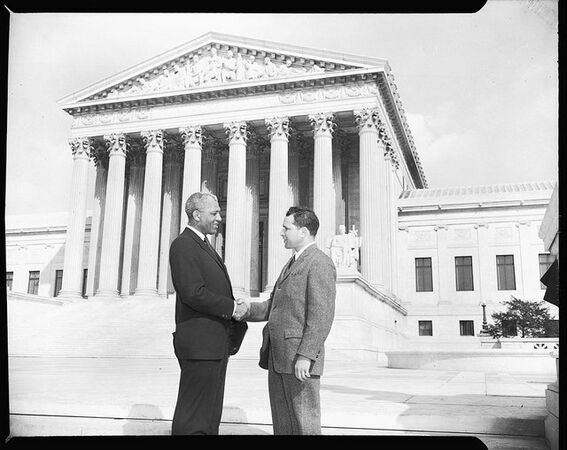The Dutra Group v. Batterton
 | |
| The Dutra Group v. Batterton | |
| Term: 2018 | |
| Important Dates | |
| Argument: March 25, 2019 Decided: June 24, 2019 | |
| Outcome | |
| Reversed and remanded | |
| Vote | |
| 6-3 | |
| Majority | |
| Chief Justice John G. Roberts • Clarence Thomas • Samuel Alito • Elena Kagan • Neil Gorsuch • Brett Kavanaugh | |
| Dissenting | |
| Ruth Bader Ginsburg • Stephen Breyer • Sonia Sotomayor | |
The Dutra Group v. Batterton is a case argued before the Supreme Court of the United States on March 25, 2019, during the court's 2018-2019 term. It came on a writ of certiorari to the United States Court of Appeals for the Ninth Circuit.[1]
The case concerned maritime law. On June 24, 2019, the U.S. Supreme Court reversed the 9th Circuit's ruling and remanded the case. The court ruled 6-3, with Justice Samuel Alito writing the majority opinion. Justice Ruth Bader Ginsburg dissented, joined by Justices Stephen Breyer and Sonia Sotomayor. Click here for more information on the opinion.
You can review the lower court's opinion here.[4]
Timeline
The following timeline details key events in this case:
- June 24, 2019: U.S. Supreme Court reversed the 9th Circuit's ruling and remanded the case.
- March 25, 2019: Oral argument
- December 7, 2018: U.S. Supreme Court agreed to hear case
- August 30, 2018: Petition filed with U.S. Supreme Court
- January 23, 2018: United States Court of Appeals for the Ninth Circuit affirmed lower court's decision
Background
Christopher Batterton was injured while working on a vessel owned and operated by The Dutra Group. A hatch cover blew open and crushed his hand because the vessel was missing a safety feature, making the vessel unseaworthy. Batterton sued Dutra for punitive damages. Dutra filed a motion to strike the claim, but the district court denied the application. Dutra then "filed for interlocutory appeal on the punitive damage issue, which was granted by the Ninth Circuit, which affirmed the lower court decision," according to The American Bar Association.[5]
The Ninth Circuit Court and the Fifth Circuit Court "differ on whether punitive damages can be recovered based on a claim of unseaworthiness. The Ninth Circuit recently ruled that punitive damages are recoverable under claims for vessel unseaworthiness. Batterton v. The Dutra Group, 880 F.3d 1089 (9th Cir. 2018). The Fifth Circuit arrived at the opposite conclusion in 2014 in McBride v. Estis Well Service, 768 F.3d 382, 384 (5th Cir. 2014) (en banc)," according to The American Bar Association.[5]
Batterton appealed to the Supreme Court, and the court agreed to resolve the circuit split on November 13, 2018.[5]
Question presented
The petitioner presented the following question to the court:[2]
Question presented:
|
Outcome
On June 24, 2019, the U.S. Supreme Court reversed the 9th Circuit's ruling and remanded the case. The court ruled 6-3, holding a "plaintiff may not recover punitive damages on a claim of unseaworthiness."[3]
Justice Samuel Alito wrote the majority opinion. Justice Ruth Bader Ginsburg dissented, joined by Justices Stephen Breyer and Sonia Sotomayor.
Opinion
In his opinion, Justice Alito wrote:[3]
| “ | Because there is no historical basis for allowing punitive damages in unseaworthiness actions, and in order to promote uniformity with the way courts have applied parallel statutory causes of action, we hold that punitive damages remain unavailable in unseaworthiness actions.[6] | ” |
Dissenting opinion
Justice Ginsburg filed a dissenting opinion, joined by Justices Breyer and Sotomayor.
In her dissent, Justice Ginsburg wrote that she would confirm the 9th Circuit's judgment based on precedent established in Atlantic Sounding Co. v. Townsend. Ginsburg argued that in Atlantic Sounding, "this Court held that punitive damages are available in actions for maintenance and cure under general maritime law," and that under Atlantic Sounding, "punitive damages are not categorically barred in unseaworthiness actions."[3]
Text of the opinion
Read the full opinion here.
Audio
- Audio of oral argument:[7]
Transcript
- Transcript of oral argument:[8]
See also
External links
- U.S. Supreme Court docket file - The Dutra Group v. Batterton (petitions, motions, briefs, opinions, and attorneys)
- SCOTUSblog case file for The Dutra Group v. Batterton
Footnotes
- ↑ Supreme Court of the United States, "18-266 The Dutra Group v. Batterton," accessed February 24, 2019
- ↑ 2.0 2.1 Supreme Court of the United States, "18-266 The Dutra Group v. Batterton," accessed February 24, 2019
- ↑ 3.0 3.1 3.2 3.3 Supreme Court of the United States, The Dutra Group v. Batterton, decided June 24, 2019
- ↑ SCOTUSblog, "The Dutra Group v. Batterton," accessed February 24, 2019
- ↑ 5.0 5.1 5.2 The American Bar Association, "SCOTUS Grants Certiorari to Resolve Circuit Split in Maritime Cases," December 18, 2018
- ↑ Note: This text is quoted verbatim from the original source. Any inconsistencies are attributable to the original source.
- ↑ Supreme Court of the United States, Dutra Group v. Batterton, argued March 25, 2019
- ↑ Supreme Court of the United States, The Dutra Group v. Batterton, argued March 25, 2019
| |||||||||||












